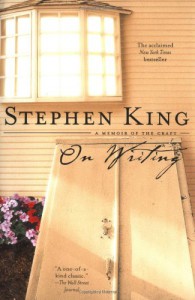On Writing: A Memoir of the Craft
 This book is a good example of bad writing. There you go, Steven King - thanks to your precious advice I managed to write the perfect sentence - short, to the point, no pretentious words, no adverbs, no passive voice and, most importantly - honest!
This book is a good example of bad writing. There you go, Steven King - thanks to your precious advice I managed to write the perfect sentence - short, to the point, no pretentious words, no adverbs, no passive voice and, most importantly - honest!If anything, On Writing: A Memoir of the Craft did inspire me to write:
On Reading: the Thoughts of a Random Reader:
Let me start off by saying that this book is all over the place. It does not flow, it makes sudden and inexplicable jumps from one story to another without any logical prelude. For someone with so much experience and knowledge, King did a pretty bad job of choosing the title for this novel. It doesn't have much to do with the contents and is not metaphorical either. But then, metaphor is not a welcome literary technique anyway. According to the author, plain, obvious and direct honesty is what will get through to the reader.
There is a lot I want to write about, but I am afraid it won't be possible without giving too much away. Now, I am well aware that Stephen King has sold millions of copies of his works (he made sure to remind me every so often), and I am an anonymous noone who knows little about writing, which automatically puts me in no position to judge. Still, I have this strong urge to express my disagreement with almost everything this book offers as guidelines for writing (I am paraphrasing King's words in italic below):
1. Various literary tools (adverbs, less known words, passive voice, etc.) will only make the story heavier and unreadable. Really? Since when is language, with all its richness, imagery and potency, enemy of the good book? I would rather have a writer who has overtried with language and failed than someone with limited range of tools, who dishes out a suspenseful story on a regular basis.
2. Dialogue is the most important part in a book and very chosen few have mastered it (King being one of them). - Oh well.
3. Physical descriptions of characters are useless. Their actions is what defines them. - I, from the standpoint of an ordinary reader, have often been more affected by the description of scarred skin, a wrinkle, a crippled leg, a luscious lip or a dimple, than by a hundred pages of heroic twists and turns.
4. Audiobooks are great! Sure. I agree that 'Subject-verb' sentences are better heard as background noise while one is doing their mundane chores. They don't call it reading for no reason, though. To be able to appreciate the beauty of literature, one needs to isolate themselves and follow with the eyes the paths these magic little squiggles, called words, lead us along. Written language is the magic called literature. The ears are for the magic called music.
5. Shakespeare and Yates are both genius! To put these two in the same context is ludicrous to me.
6. Good writers are productive. What on Earth can they be doing if not writing? - Err, hmm, drinking, sinking in misery, searching, losing, finding, having a life?
7. Writing is hard labour and discipline. It is counting words and setting deadlines. Yet King has never made it for the money, but for the immense pleasure he derives from it. - I am not qualified enough to contradict the contradiction here.
8. Readers don't care for literary merits but for storyline and suspense. They should be the writer's main concern and therefore the writing should be simple. - This is where things became personal for me. This is insulting to readers who actually love and value language, and it made me cringe in disgust.
I will not comment on the autobiographical part of the book, which was vague and out of place. I will not comment on the tone of the book, which was over-preachy and self-indulgent. I have commented enough to be branded a 'hater' already. I am actually quite ashamed of my recent one-star reviews and will go get a life now. No manuals please.




